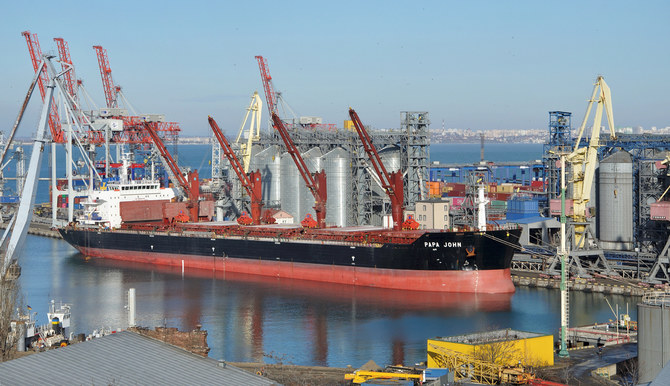RIYADH: The Group of Seven economic powers called on Sunday for the "extension, full implementation and expansion" of a critical deal to export Ukrainian grain through the Black Sea, the group's agriculture ministers said in a communique.
Brokered by the UN and Turkey, the deal was signed in Istanbul last July, allowing Ukraine to export more than 27 million tons of grain from several of its Black Sea ports.
Russia, which invaded its neighbor in February 2022, has strongly signaled that it will not allow the deal to continue beyond May 18 because a list of demands to facilitate its own grain and fertilizer exports has not been met.
In the communique after a two-day meeting in Miyazaki, Japan, the G7 agriculture ministers "recognized the importance" of the deal, saying: "We strongly support the extension, full implementation and expansion of (the Black Sea Grain Initiative) BSGI."
G7 members "stand ready" to support recovery and reconstruction of Ukraine, including by providing expertise in de-mining of agricultural land and reconstruction of agricultural infrastructure, the document said.
Russian Foreign Minister Sergei Lavrov is scheduled to discuss the Ukraine Black Sea grain export deal with UN Secretary-General Antonio Guterres in New York this week.
Meanwhile, Ukraine's prospects of unblocking grain shipments to Eastern Europe improved last Friday as Romania opted against a unilateral ban on food imports, but there was no progress on extending a deal on Black Sea exports.
Grain sales are a vital revenue source for Kyiv, and food import bans imposed by four EU member states in Eastern Europe have increased Ukraine's concerns about its food exports.
Offering Kyiv some relief, Romania said it would not join Bulgaria, Hungary, Poland and Slovakia in banning food imports from Ukraine to protect local producers hit by an influx of cheaper Ukrainian supplies.
Instead, Bucharest will wait for the European Commission, the EU executive, to enforce measures to help farmers in central and eastern Europe.
"I think it is necessary we wait ... to see what the Commission decides, and then we will meet again to establish long-term rules, because Romania and Ukraine are large grain producing countries," Agriculture Minister Petre Daea said.
A major grain transit hub for Ukraine, Romania's Black Sea port of Constanta shipped some 12 million tons of Ukrainian grains in 2022 and the first quarter of this year.
Daea said, after talks with Ukrainian Agriculture Minister Mykola Solsky, that Romania and Ukraine would consult weekly on expected grain volumes, as Romania tries to limit imports.
Solsky told reporters it was obvious the situation required quick decisions, adding: "We understand these decisions must be comfortable for Romanian farmers and ... we wait for the European Commission."
GRAIN DEAL HANGS IN BALANCE
The European Commission has announced plans to offer farmers in eastern and central Europe compensation for some products if the unilateral import bans are lifted, but the countries affected want the list of products widened.
Black Sea grain exports are more significant for Kyiv than exports to Eastern Europe, and talks are under way on the status of the Black Sea Grain Initiative deal agreed last July to create a safe shipping channel.
The initiative unblocked three Ukrainian Black Sea ports five months after Russia's invasion, and was designed to alleviate a global food crisis as well as to support Ukraine.
Russia says it has agreed to extend the deal only until May 18 even though Kyiv and its allies say the terms of the agreement stipulate that it should continue beyond that date.
Worried about its ability to ship grain from its Black Sea ports, Ukraine has stepped up exports via ports on the Danube River that flows though central and southeastern Europe.















